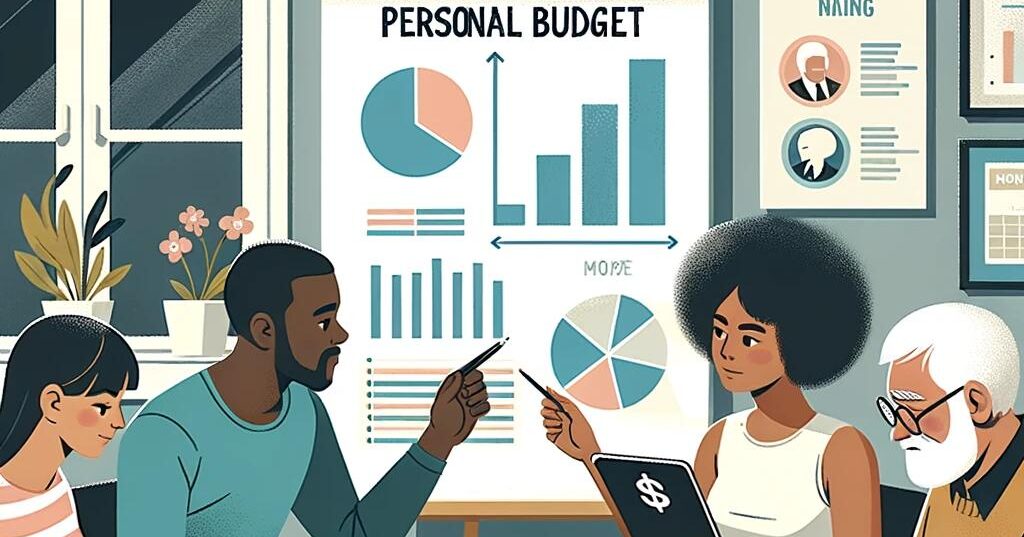TL;DR:
- Create a personal budget by tracking all income and expenses and dividing expenses into fixed and variable categories.
- Review and adjust the budget monthly to align with financial goals and realities.
- Utilize tools, such as online budget planners or apps like Mint and PocketGuard, to simplify the budgeting process and prevent overlooking any incomes or expenses.
- Apply the 50/30/20 rule for a basic budget allocation: 50% for needs, 30% for wants, and 20% for savings/debts. Adjust these percentages as per your lifestyle.
- Budgeting is critical even with low income; track all income sources and expenses, aim for a surplus, and use a budget calculator.
- Maintain regular budget review, and stick to it. Dave Ramsey's tips: avoid spending more than you earn and avoid debts.
- Formulating a personal budget aids in creating a strong financial plan. Regular review and adjustment ensure its effectiveness.
Embarking on a journey towards financial sustainability? One of the initial and essential destinations is creating a personal budget. It sounds daunting, right? But what if I told you that devising a spending plan doesn't have to be complicated or elusive? Stick around, and let's walk through an easy, approachable guide to kick-start your budget creation. Your personal finance adventure starts here with PennyPinnacle. Let's empower you to take charge of your money. Begin your quest with us!
How to create your personal budget
First, you need to track your income, from your main gig to the side hustles. You have several financial streams, remember, so include them all. Make a list of your expenses. What are your monthly bills? Any other obligations you have to fulfill? Remember to include both regular and irregular expenses here.
Split your expenses into two groups: fixed and variable. Your rent, for example, is a fixed expense; the power bill can change from month to month, making it a variable expense. Make an estimation for the variable bills and keep it safe, any surplus goes to your savings.
Now, it's time to do the math. Add all your income sources together, then subtract all your expenses. This will tell you where you stand. Do you spend more than you earn, or is there some money left at the end of each month? Use this knowledge to set goals – like saving for a rainy day or a big purchase – and to make changes if you spend too much.
And remember, your budget is not carved in stone. Look at it at least once a month and adjust it as needed. Changing incomes, new expenses, a completed savings goal – all these can affect your budget and require some tweaks. Keep this in mind and make sure your budget always aligns with your financial goals and realities.
The process of creating a budget involves setting goals, learning to track expenses and income, and adjusting to meet needs. Spending more on things you love and less where it doesn't matter as much, takes focus and commitment. But the effort is well worth the control and peace of mind it provides. To create your personal budget plan, visit this site for an easy to follow guide.
What are the best tools to simplify my budget planning process?
Want to tame your budget fast, right? You need powerful tools.
How can an online budget planner help me?
An online budget planner is that magic wand. It lets you track spending, master goals, and spot trends. It even turns your financial picture crystal clear, minus the math stress. Want more? It can be used anywhere, anytime, thanks to the web.
This isn't just easy, it's clever. It ensures that you don't forget any income or expenditures. Your net pay, side jobs, or any irregular income. And yes, even your little sneaky expenses. Everything is tracked, nothing slips past.
What are the best budget planning apps?
Up next, budget planning apps. These are your pocket-sized finance gurus. Handy, right? Opt for top picks like Mint, PocketGuard, or YNAB. Each one is unique, and loaded with features to help you.
Let's talk practical. You're at a store, debating a purchase. To buy or not to buy, that gadget on sale? Fire up the app, peep your budget category, and presto! Decision made.
But remember, planning and tracking your budget is key. It's no set-and-forget game. Regular reviews of your budget are a must to keep it spot on with your goals and life changes.
Whether you choose an online planner or an app, both give you control. They're your personal finance helpers, making your budget work for you. And they're all geared up to set you on the path to sound financial habits. So, kick off your budget journey, it's time to simplify!

How can I successfully divide my income into budgeting categories?
Let's dive into a world where your money gets a plan. The first rule we'll explore is the 50/30/20 rule in budgeting. This rule sees your income in three parts. Fifty percent goes to needs, thirty percent to wants, and twenty percent to savings and paying off any debt.
What is the 50/30/20 rule in budgeting?
The 50/30/20 rule makes your money easy to manage. Half, or 50%, takes care of your needs, such as rent and groceries. Thirty percent, or less, goes to your wants, like dining out or new shoes. The leftover 20% goes to your savings or paying off debts.
Remember, this isn't a rigid rule; adjust it to fit your life.
What are the important budget categories to consider?
Next, let's look at the budget categories. Think of these as buckets your money goes into.
Fixed expenses are your set costs each month – think bills. Variable expenses are costs that can change each month, like utilities. Consider all your monthly income and expenses to find your budget's stand. Set a goal for your money, review your budget, and make needed tweaks.
Keep in mind: your side jobs or irregular income all counts! Even those odd jobs or a sudden cash gift can go into your budget plan.
You don't have to perfect your budget in one go. Life changes mean budget changes. Keep an eye on it. Adjust as needed, and always keep saving at the core.
Budgeting can seem daunting, but breaking it down to steps and categories will make the task manageable. The 50/30/20 rule is an excellent place to start, and from there, you can adjust and customize until you have a budget that fits your life and financial goals. Don't wait another day. Start now!

How to manage my budget with a low income?
How to budget effectively on a lower income?
Earning less money can make budgeting tough, yet it's even more crucial. With a low income, a single missed payment can have serious repercussions. But don't lose hope! To start, keep track of all the money flowing in—your salary, part-time jobs, or gig economy jobs. Every dollar counts!
Now, look at your expenses. What do you pay each month? Note down everything from your rent to your Netflix subscription. Break down your costs into fixed ones (like rent) and variables (like utility bills).
Can I create a budget that fits my lifestyle?
Indeed you can, and it’s essential for staying in control of your finances! After noting your income and expenses, find out if you have a surplus or a deficit at the end of the month. In case of the latter, start by cutting unnecessary costs.
Setting goals for your money, be it an emergency fund or a vacation, will help motivate you to stick to your budget. Using a budget calculator based on income can be handy too.
Remember to check your budget regularly. Income, expenditure, and life situations change, and your budget should adapt with them. By keeping your budget in sight, you'll help ensure that it always reflects your current lifestyle and needs. It’s a skill to create a budget that fits your lifestyle, especially on a low income, but with careful planning and constant review, you can surely master it.
What are some essential budgeting tips for beginners?
Starting a budget can seem hard. But anyone can master it, even you. First, track all sources of your income. This can be your day job or some side income.
Next, make a list of all expenses. This covers monthly bills and any other money commitments you have. Pack all these into two groups: one for fixed costs like rent, and the other for changing costs such as utility bills. Deduct your total expenses from your total income. This will show if you have a surplus or deficit in your budget.
Now, set a goal. Maybe save for an emergency fund or perhaps a special buy. Goals can drive our actions. To reach your goal, transfer money to your savings account every month. Make this automatic so you won't forget.
Remember to check your budget every month. This can help you see if the plan still works as your income or expenses change. Final tip: stick to your budget.
But what about Dave Ramsey's budgeting tips? He is a finance guru after all. His tips are simple but powerful. First, don't spend more than you earn. Second, avoid debts. With these, you'll have a balanced budget sooner than you expected.
Can I make a financial plan with my personal budget?
Indeed, creating a financial plan requires setting a personal budget. By tracking all your income sources, like your net pay or side jobs, you can lay a foundation for a robust financial strategy. In addition, list the ins and outs of your cash flow, including regular and unpredictable expenses.
Can a personal budget contribute to creating a financial plan?
Absolutely! Once you separate the fixed costs (rent, car payments) from variable ones (power, water) and calculate their averages, you have a clear picture of your finances. This information helps you plan better, whether you aim for surplus or dread deficits. Goals can range from emergency funds to specific purchases or investments
How does setting a personal budget help enhance my financial capacity?
Setting a personal budget lets you find a balance. By setting up automated transfers to a savings account, you can harness any surplus to boost your financial capacity. To ensure its validity, regularly review and adjust your budget to align it with changes in income or expenses. This financial capacity building through budgeting will significantly contribute to your financial planning endeavors.
Consistent monitoring of your budget ensures that you have a realistic understanding of your financial situation and can make changes as needed. This kind of disciplined approach to financial planning is a big step towards financial independence and security.
Remember, revising your budget whenever necessary guarantees its usefulness. With a personal budget, setting and achieving financial goals isn't just possible; it's a path to financial peace.
Conclusion
Understanding how to create and manage a personal budget offers significant control over your finances. The tools mentioned here can bring simplicity to your process. Be mindful of the 50/30/20 rule while carving out the budget categories, even with a low income. If you follow these budgeting tips and integrate your budget with a financial plan, you'll not just survive, but thrive financially. Remember, budgeting is a stepping stone to financial freedom, not a constraint. Embrace it. Transform your future.



